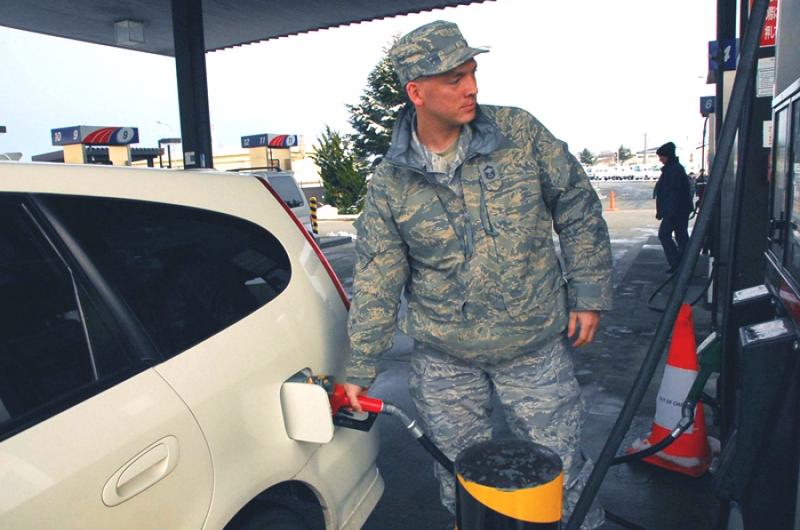

This website was created and maintained from May 2020 to May 2021 to commemorate the 75th anniversary of Stars and Stripes operations in the Pacific.
It will no longer be updated, but we encourage you to explore the site and view content we felt best illustrated Stars and Stripes' continued support of the Pacific theater since 1945.
Base up and running, Misawa now faces off-base heating oil shortage

Senior Master Sgt. Gene Eastman, 39, of Everett, Wash., pumps gas at the AAFES gas station at Misawa Air Base on Wednesday. Officials said the station had received additional fuel following concerns of a shortage.
By T. D. Flack | Stars and Stripes March 16, 2011
MISAWA AIR BASE — Shortages of fuel oil caused by the widespread destruction from the earthquake and tsunami might force some military community members who live off base to seek shelter on the base, an official said.
Col. Michael Rothstein, commander of the 35th Fighter Wing, has asked his staff to find accommodations for those who run out of heating oil in their off-base homes. Options could include housing them in vacant units on the base.
The deadly quake and tsunamis that ravaged hundreds of miles of coastline in northeastern Japan disrupted resupply lines for the region. Officials from the Aomori Oil Commercial Society, an organization for gasoline retail outlets in the prefecture, said supplies of gasoline and heating oil have been scarce since the earthquake.
“The situation is very severe,” said spokesman Satoshi Miura, saying that only 30 percent of gas stations in the prefecture were open Wednesday. But their tanks will soon be empty “with no supply ... coming,” he said.
During an interview Wednesday in his emergency operations center, Rothstein said he wanted “prudent planning,” so the base could be ready for the possibility “in an elegant manner,” instead of simply reacting to a problem.
The air base lost electricity and phone communication when Japan’s largest recorded earthquake hit. Base officials immediately launched recovery efforts, setting up generators, offering free phone calls to the States, and staffing an emergency sleep area in the Potter Fitness Center.
In the five days since the quake, power and heat have been restored to all housing units. Residents can shop at the base exchange, and the food court is open. The commissary, which started selling goods in front of the store just hours after the quake, has been resupplied with the items that were in demand, including batteries, candles, charcoal and flashlights. Defense Commissary Agency officials said Wednesday that rationing of food and other necessities was not expected at any commissaries in Japan because regular deliveries are being made.
On Wednesday, Misawa’s AAFES gas station received more fuel, which will continue to be rationed. Customers who have less than a quarter of a tank are authorized to purchase 10 gallons of gas. The military has its own contracted gas supply. The only other bases enforcing rationing in Japan were Yokosuka Naval Base and Naval Air Facility Atsugi – both in the greater Tokyo area. Customers there were limited to 5 gallons of gas.
Col. Guillermo Tellez, commander of the 35th Medical Group, told community members during a briefing Wednesday in the Mokuteki Community Center that the base and surrounding communities would be spared the rolling blackouts planned across other areas of Japan to ease power demands. He also stressed a message coming down strong from the command: conserve. Conserve gas, conserve electricity, conserve heating oil. Commute in groups, take the shuttle bus that has started running, and turn off unnecessary lights.
“We’re all in this together,” he said.
Officials also said that various spouse groups on the base want to begin meeting with members of the community to work through issues and to give them a chance to interact. The first meetings were planned for 10 a.m. to noon in the community rooms of Tower 118 and 214. All members of the community are invited.
Rothstein said that since the base is on pretty steady footing, the priority now turns to what the U.S. military is calling “Operation Tomodachi,” helping the Japanese communities hardest hit by the quake, tsunami and hundreds of aftershocks.
“Five, 10, 50 years from now, you’ll remember being boots on the ground,” helping the Japanese with their relief efforts, he said during a command briefing.
And as relief efforts continue, he wants Misawa airmen to be ready for any tasking they’re given.
“I have no major limitations now,” he said.


